This summer, my friend Daan spent several weeks on an American ship, Research Vessel Neil Armstrong. It was in the middle of the ocean, somewhere between Greenland and Iceland, in a region known as Reykjanes Ridge. I decided to interview him about his time away.
Daan with a portrait of Armstrong in the ship’s aft stairwell (more nautically precise term for hallway) that “stares at you like the Mona Lisa. Whichever the perspective, Armstrong looks straight at you.”
Alright. First question; why were you there?
So I’m an oceanographer. Normally, I only model the ocean. It’s super expensive to investigate the ocean, actually go there and stuff, so most people are modellers. But you still need to know how ocean observations are done. It was kind of my initiation as an oceanographer. What’s funny is that some observationalists think that modellers think their models are perfect and stuff. So they think we don’t truly credit their observations. Even though no modeller would ever say ‘we can do without observations’.
So I went out there to see what it’s like, to see the ocean.
It’s a bit as if someone would criticize movies or video games and say ‘but it’s not realistic’, but that’s not fully the point right?
Yeah, or as if video game people would say ‘omg real games are dumb, because there’s not enough possibilities’.
What was your daily routine?
You always sleep like a baby and till late: the ocean rocks you to sleep. If you’re not seasick. I would sleep until 11am, have lunch, chill in the lab. My shift would officially start at noon but I usually started later, like four.
How come?
Because people were also deploying instruments. I was only doing routine measurements when no instruments were being deployed. There’s these instruments on a cable attached to the ocean bottom, continuously monitoring the ocean, and you need to release them from the ocean floor. You send an acoustic signal and they float up, you collect them and deploy new ones that will be there for 2 years.
In between, you go from station to station to measure the ocean at a specific coordinate. So we would cruise - steam, you say steam - to a station and I would prepare this big instrument. I’d unstrap it and tell the winch operator, a person who operates a big crane, to send the instrument down. “Bridge deck, permission to deploy”. “Permission to deploy, CTD’.
What’s CTD?
Connectivity, Temperature, Depth. That’s the measurements we take. Name of the instrument, name of the activity, name of the variable.
Then I would go back to the lab. This huge cable with the instrument would go down at 1m per second. The ocean is about 2km down, so you wait about an hour. At certain depths, you stop the machine and ‘fire a bottle’. The bottlecaps snap on, trapping sea water. Those are the samples you use to calibrate the instruments.
How do you decide when to stop?
It’s a feeling.
Haha really?
Yeah haha, you get a bit of a specific increment that feels right. You usually want to know more about the upper ocean because there’s a lot happening there, but it’s kind of arbitrary.
Reminds me of this Chef’s Table Pizza episode where this guy learns how to make mozzarella and asks his teacher ‘so when is the mozzarella ready?’ and the teacher responds ‘when it smiles’.
Haha I mean honestly, you feel - you learn how to feel it. There’s a chief scientist who kind of tells you what to do at first, which depth increments make sense. And at a certain point, you know. You make a chart of the ocean, telling you the salinity and temperature at each depth - that’s what you collect. So using the collected water, you can calibrate the profile, which contains features of the ocean. The sampled water is purely used to accurately calibrate the electronic instruments.
Sometimes, you don’t just collect water, but also octopus slime and weird stuff. You flush it out with a hose. You’ll see something odd in the chart and know, that was probably some fish or organism that got sucked up or something.
And back to your routine. Your shift started in the afternoon, and until what time?
Till midnight. I would always have nighttime cereal afterwards. They had very good almond milk haha. Because it was an American ship they had all these different types of cereal so I tried them all, and fiber ones cause you want to stay healthy.
What was the food like?
The chef was very nice. A bit on edge, but well-meaning. He would sometimes cook vegan. But then he just boiled tofu in tomato sauce. Not his best. There was a lot of American stuff, like crab cakes, and the jelly beans were very diverse. The cheeses were kind of what American people think a European cheese platter looks like. For a while, I associated cheese with seasickness.
So how do you stay healthy during your time there?
Sometimes I would walk on deck in circles to get fresh air. There’s also a gym all the way at the bow of the ship. It’s kind of scary because you need to go down a hatch. In the case of an emergency, they can probably only save 1 or 2 people, so you’re not allowed to go with more. The gym has a slowly closing door, moving at a centimeter a minute or something. You need to exit before the door closes.
What? Why?
To trap the water. It hermetically seals, with a hydraulic system that has no mercy. There was this cadet on board, Ella, who was always telling me horror stories. Because I asked her to. One guy at her school got trapped in a trapdoor, not during an actual emergency but during a drill.
Oh god.
Yeah, he got squished.
And then?
He died.
Shit. So what are you supposed to do, be on alert when you go the gym?
You just don’t go to the gym too often ;)
The ship people are super competent though. The welder assured me of that when he walked us through a tour of the boat. He said it was the most beautiful welding he’d seen in his whole life.
‘They did a beautiful job on this beauty’. He was great. Kyle the welder, the oiler. The engine guy.
I also sent you a picture of Pete. He’s from Boston and he’s the bosun. Which means boatswain. The person in charge of the ropes, on deck he’s just the boss. During the deployment of the instruments, he takes the lead. He says ‘Isabelle, put that A-frame in, give me some slack, hold that, HOLD THAT’.
Did all of it feel like work?
Because it’s science, it’s almost more of an endeavour than work work. An adventure, even though sometimes it was really boring.
I don’t think I’ll necessarily do it again, unless I had a cool scientific objective. It’s not that I didn’t enjoy it, but it’s rough. And long. And I missed my friends. But it didn’t feel like work. It’s mainly sitting in front of a computer, talking to a walkie talkie, ‘winch lab, go up to six zero zero meters’.
Who was on the other side of the walkie talkie?
So first: Lou and Kevin, the winch operators. Kevin was a man of few words. He would just answer ‘600’ to me whereas Lou would say ‘Copy, going up to six zero zero meters’. And then the bridge operator, Leah. She would always say:
‘Go ahead, Lou’.
They all have quite basic white anglo-saxon names.
Some, yeah. Sailor culture is New England, sometimes West coast, but the ship was from Woods Hole, I forgot which state that’s in. Near Boston.
They’re all adventurous people that very much have a mountainous culture to them, strangely enough. They like to hike, go on trails and shit.
They’re 4 months on ship and 2 months off. As soon as they get to land, they put out some deck chairs at the harbour or go to the Irish pub they frequent when in port, and start drinking right away. You’re not allowed alcohol on the ship.
Are they friends?
They have a good community, but with their own different shifts, and this American ship didn’t have a social room. Only this weird dark TV room with leather couches and Marvel films playing all day.
I had my own room, the disabled people room, because I had to isolate because of a Covid thing. I would pass by the TV room and see people sleepily chilling with American TV on, aka a lot of commercials.
Did you feel like an outsider on the ship?
I felt new. I was also wearing an anti-seasickness patch on day 1. The captain walked past me and said ‘It’s gonna get a lot rougher than this’.
Seasickness medication can apparently give you dementia. It does actually do something to your mind, makes you woozy. You’re already in a weird flow - I would sleep 11 hours a day. So you succumb yourself to the life of the ship.
Did that last?
I mean no, I didn’t actually get dementia. The medication pill was nice, tasted sweet. Took it half of the days, otherwise I would just have been puking.
So an outsider. But you were there with a purpose, right?
Yeah, and I felt like they enjoyed my curiosity about their ways. Some less talkative than others, but very much welcoming me. And this is just the crew, but there’s also the scientists’ party, and then you’re just one of them, all phd students, post-docs, my age.
Do you think everyone there had a larger goal on the ship?
Some of them might have, to make a career on the ship. And I think some of them are kind of happy to be away from society for long periods of time? Your life there is very clear, no complications. There’s no multiple social side paths you’re living, just one. It’s not very bustling. I felt more away than at home though.
What felt meaningful?
I really enjoyed watching the ocean from my porthole. And being on deck, seeing the relative motion of the ship with respect to the waves. The ship’s rocking sometimes upset my tummy, but it was also kind of cool to be at the mercy of it. Of the tides, which is just the motion of the moon in a way.
You feel tiny. And at peace with the night, the pitch blackness. The only light sometimes, especially when cloudy, comes from the ship and doesn’t carry very far. You’re staring into this black hole, and you know you’re at least a 2-day steam away from land. Zooming out on the map, you’re just in this point of vastness, emptiness.
I imagine that’s what it must be like to be out at space.
We have very high resolution imagery of the moon and shit. And we also have that of the ocean surface. But anything below, you don’t know much about. The ocean floor is more ‘unknown’ than the moon. Maybe not in terms of knowledge of composition, but visually for sure. You can see any piece of rubble on the moon from a picture, not in the ocean.
If the technology would allow you to go to the depths of the ocean, would you go?
You can! And there’s people doing it, in submersibles. I would for sure go. Worst case, you die. But then you die instantly at least, you wouldn’t even know. From the pressure, x times the weight of the atmosphere onto you. You would implode.
Anything else you’d like to share?
On my night shifts, being out on deck waiting to recover the CTD machine, sometimes this crew member would come out, smoke his little cigarette. And I felt very happy for him to have that moment.




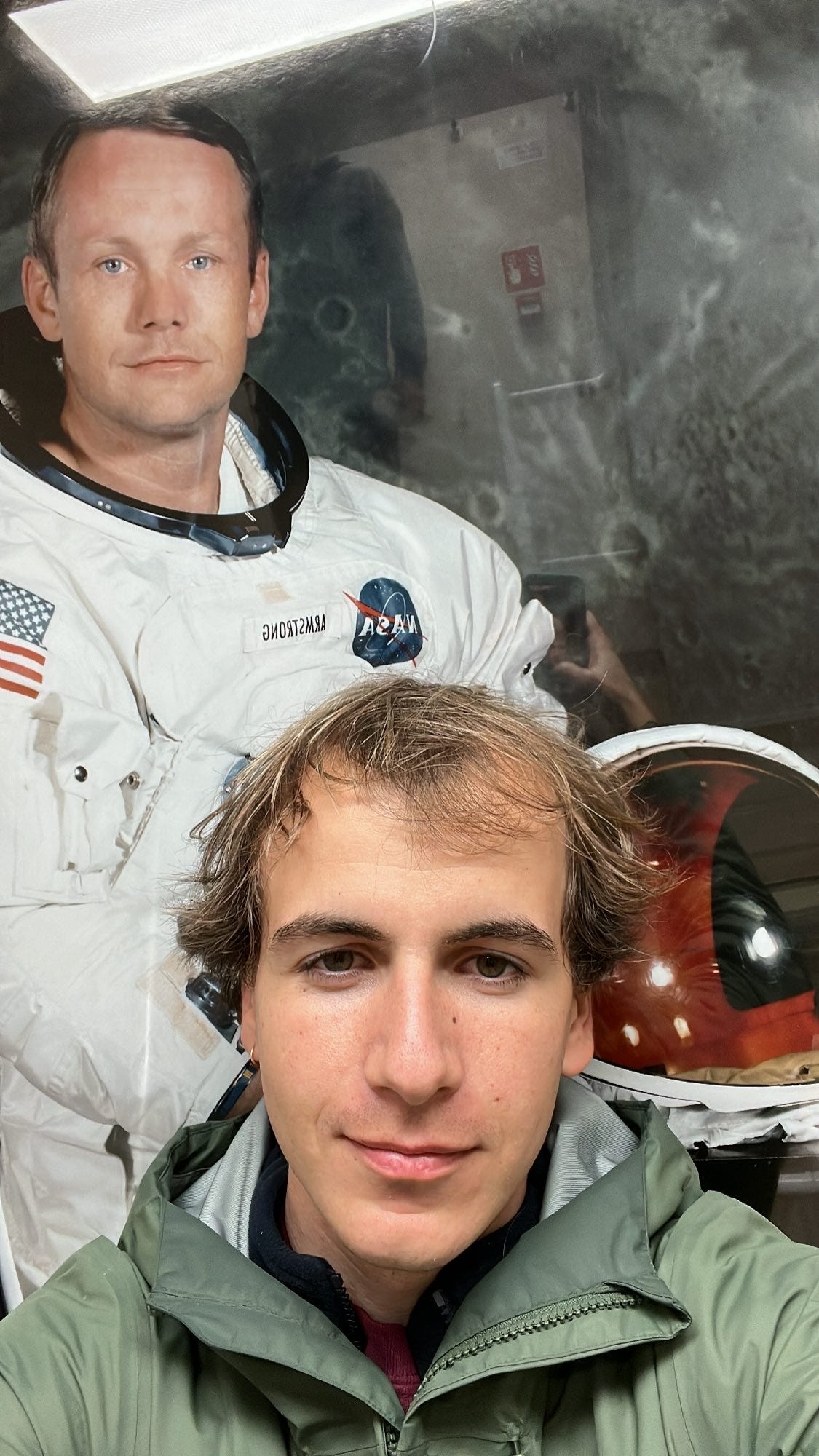
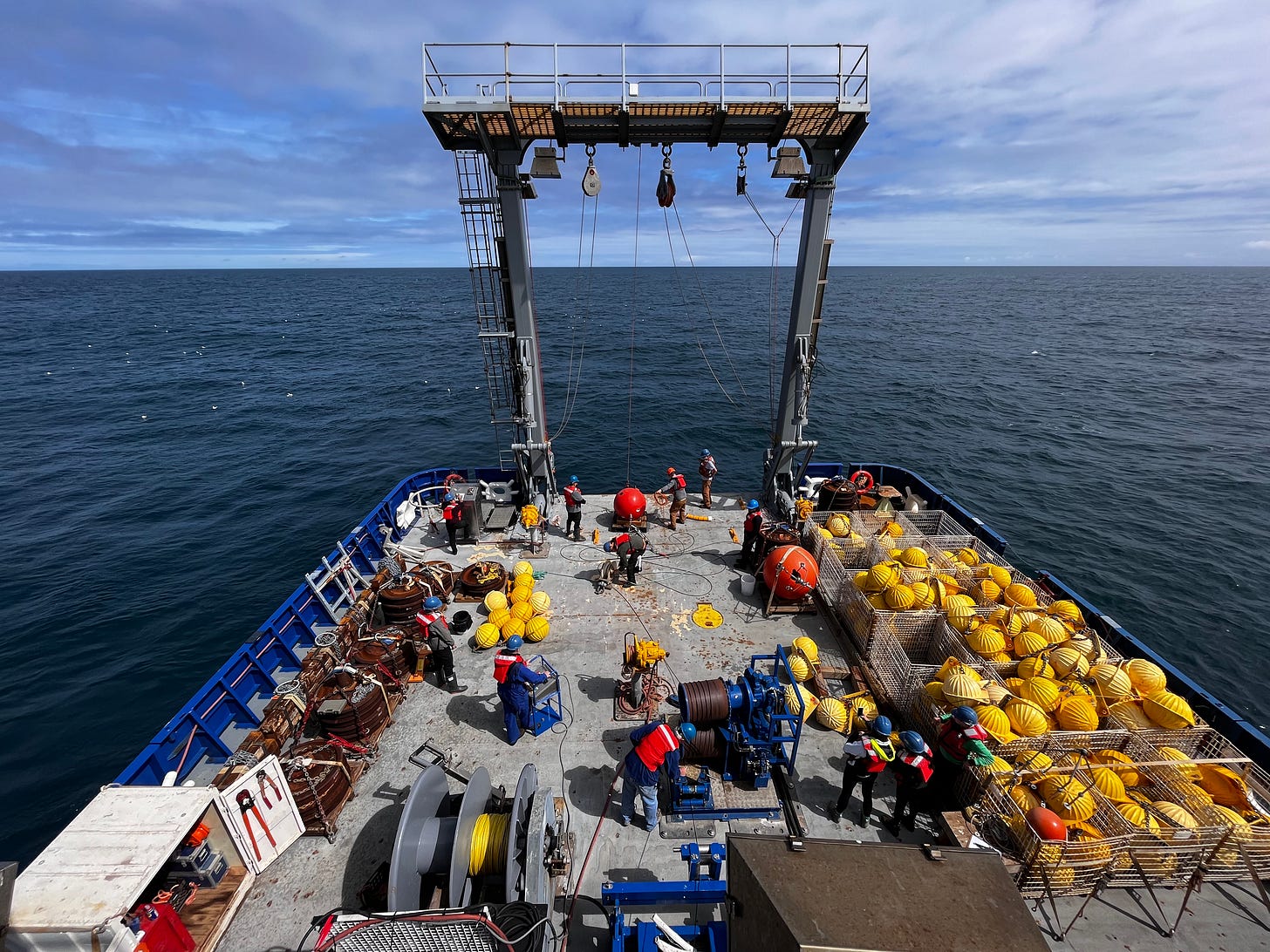
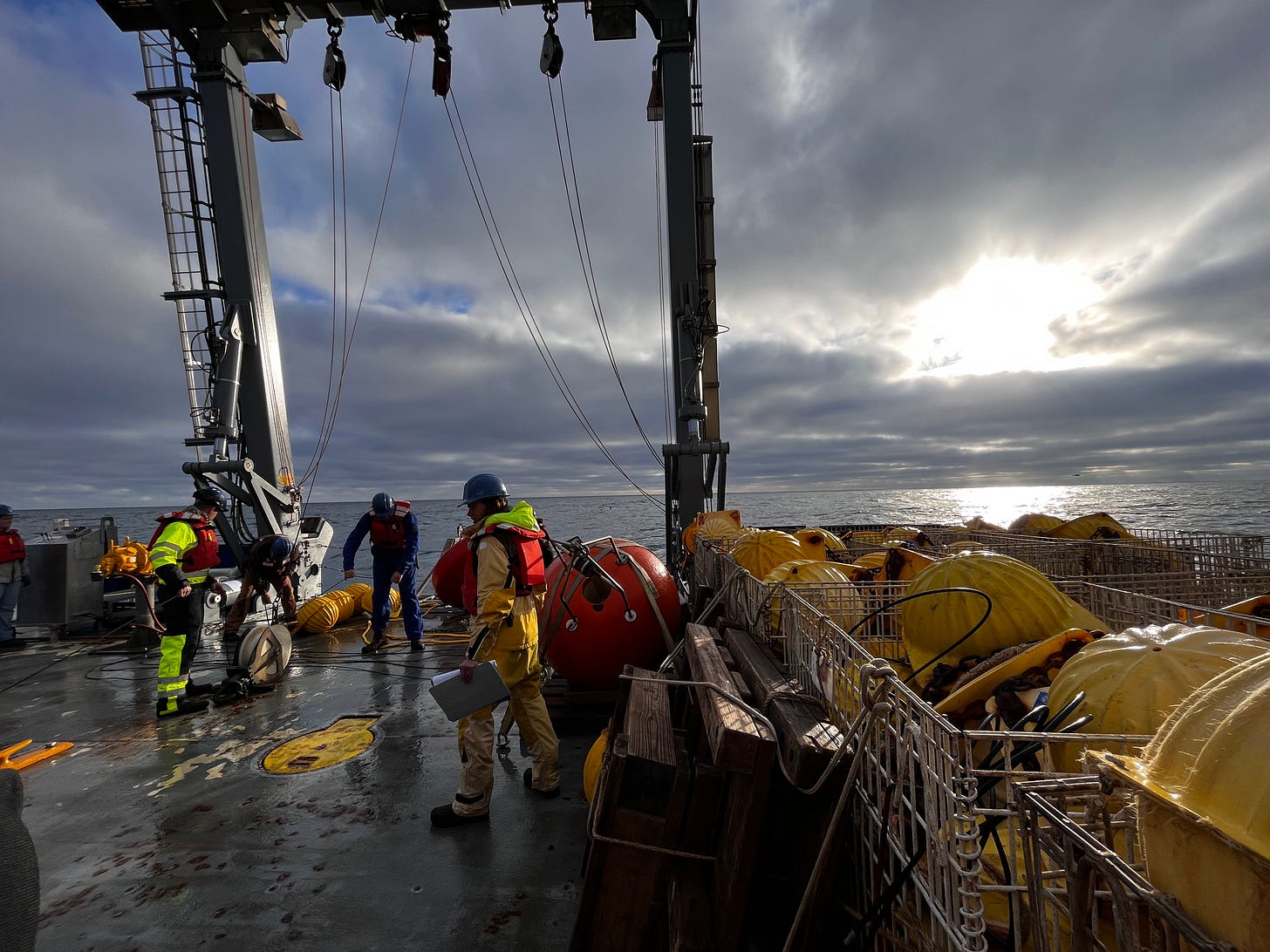
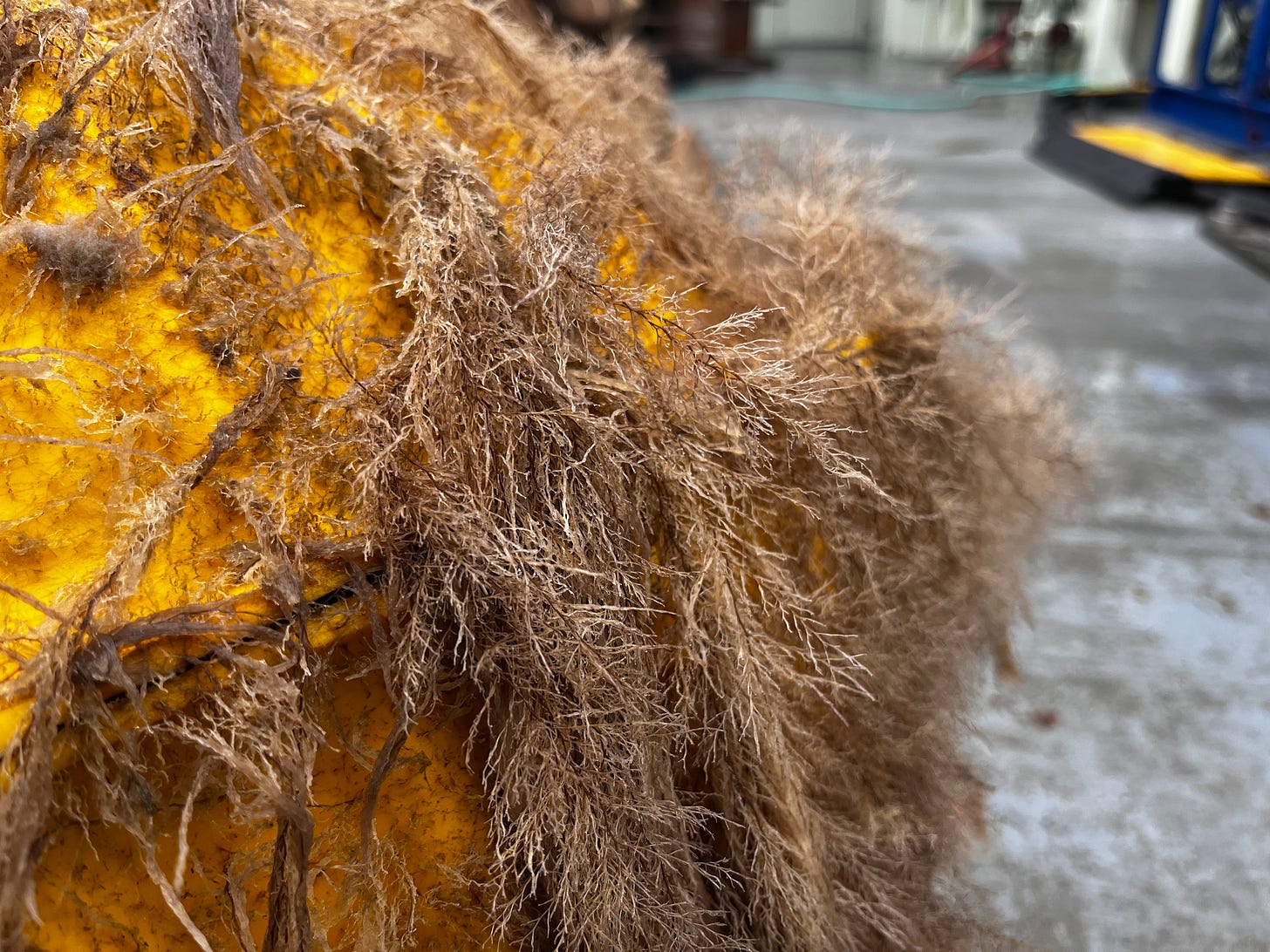

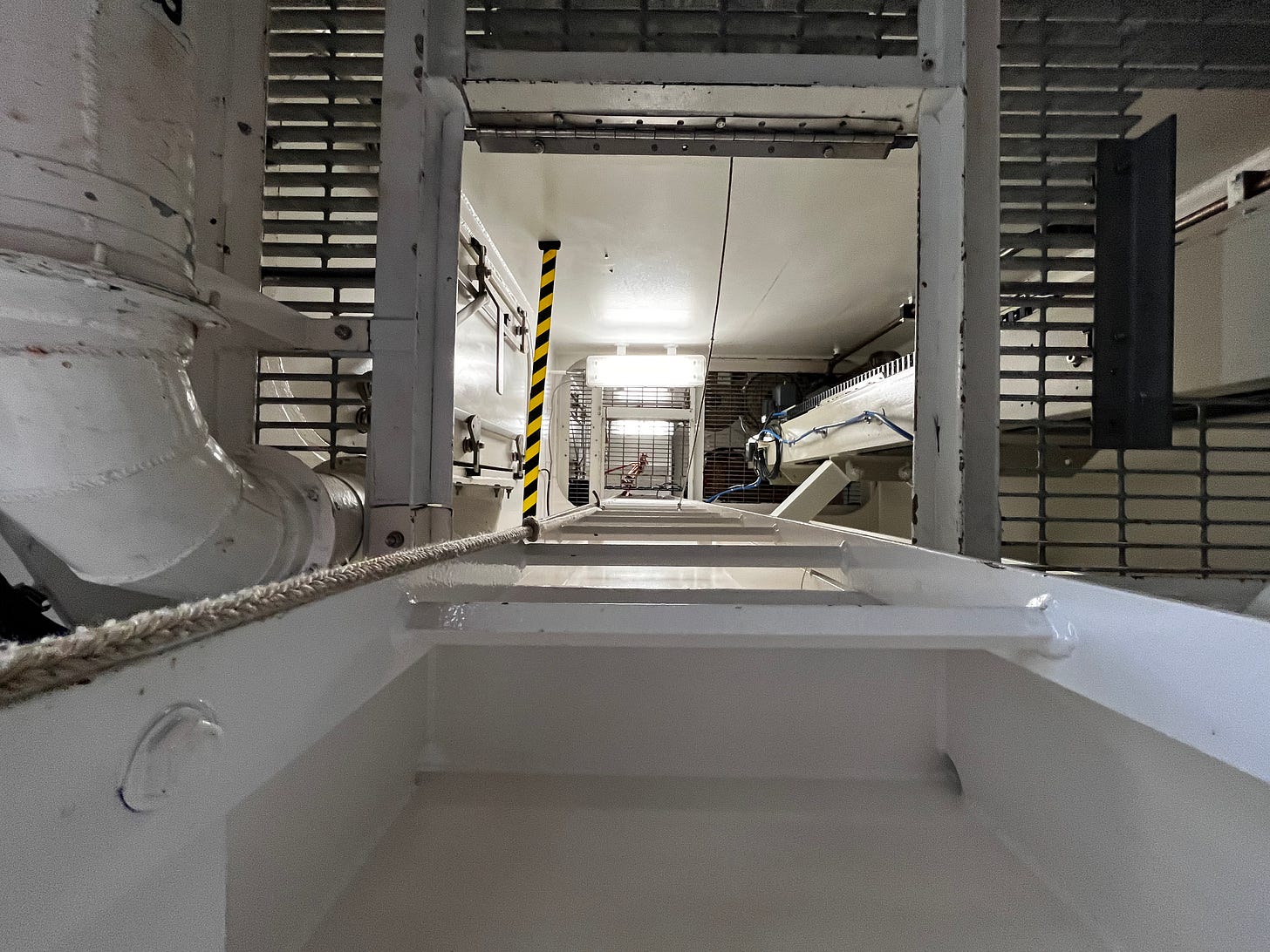
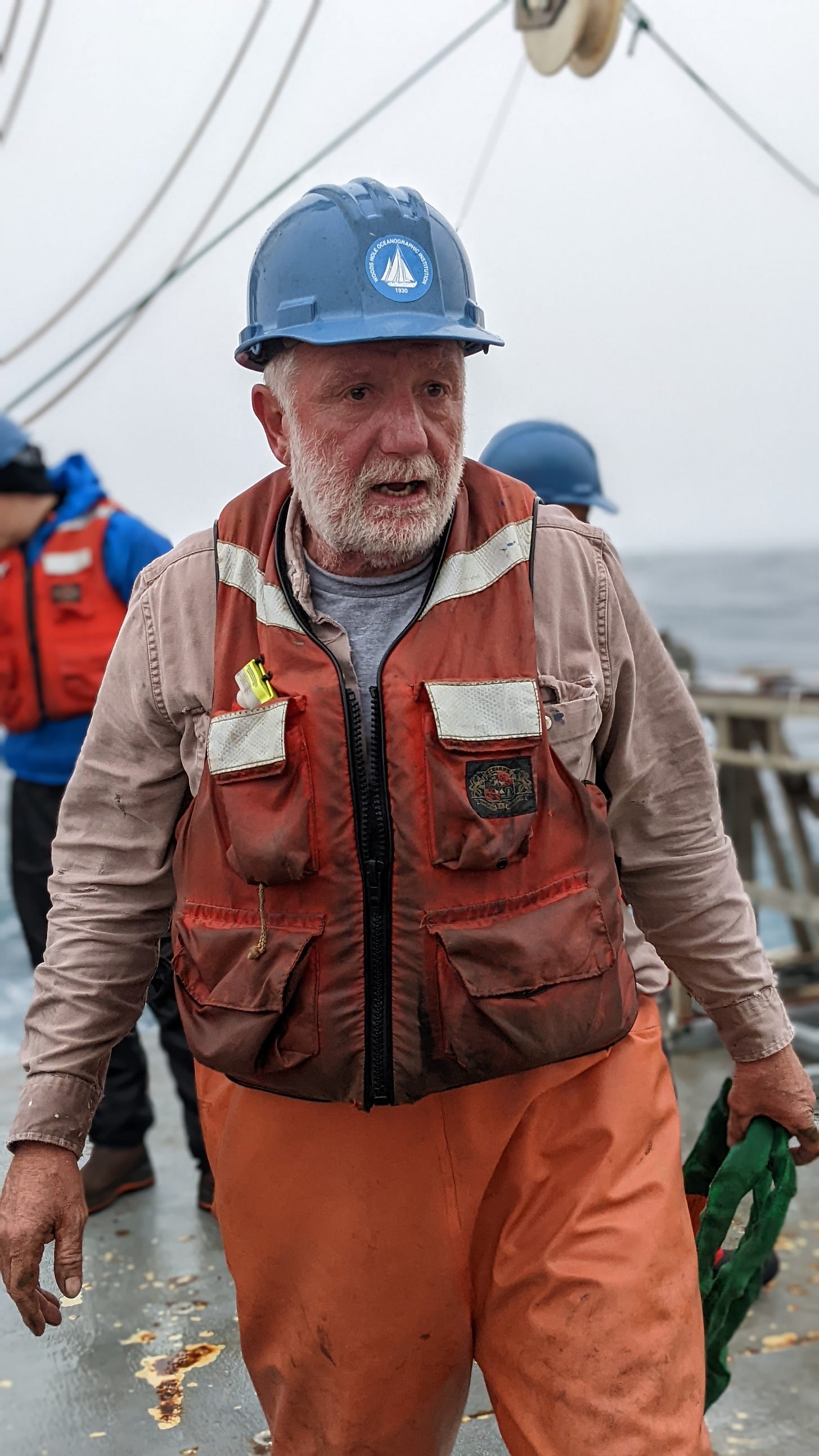
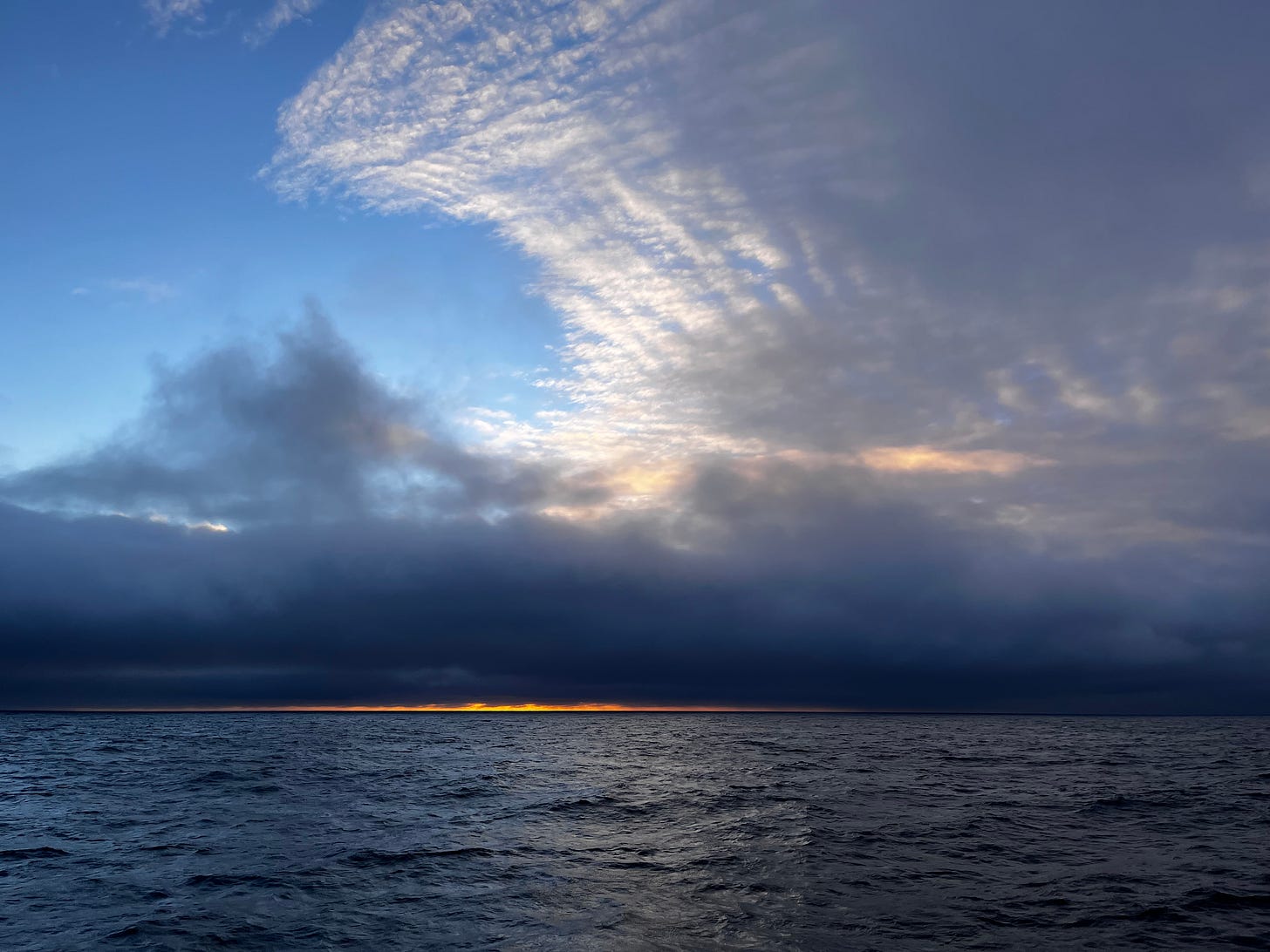
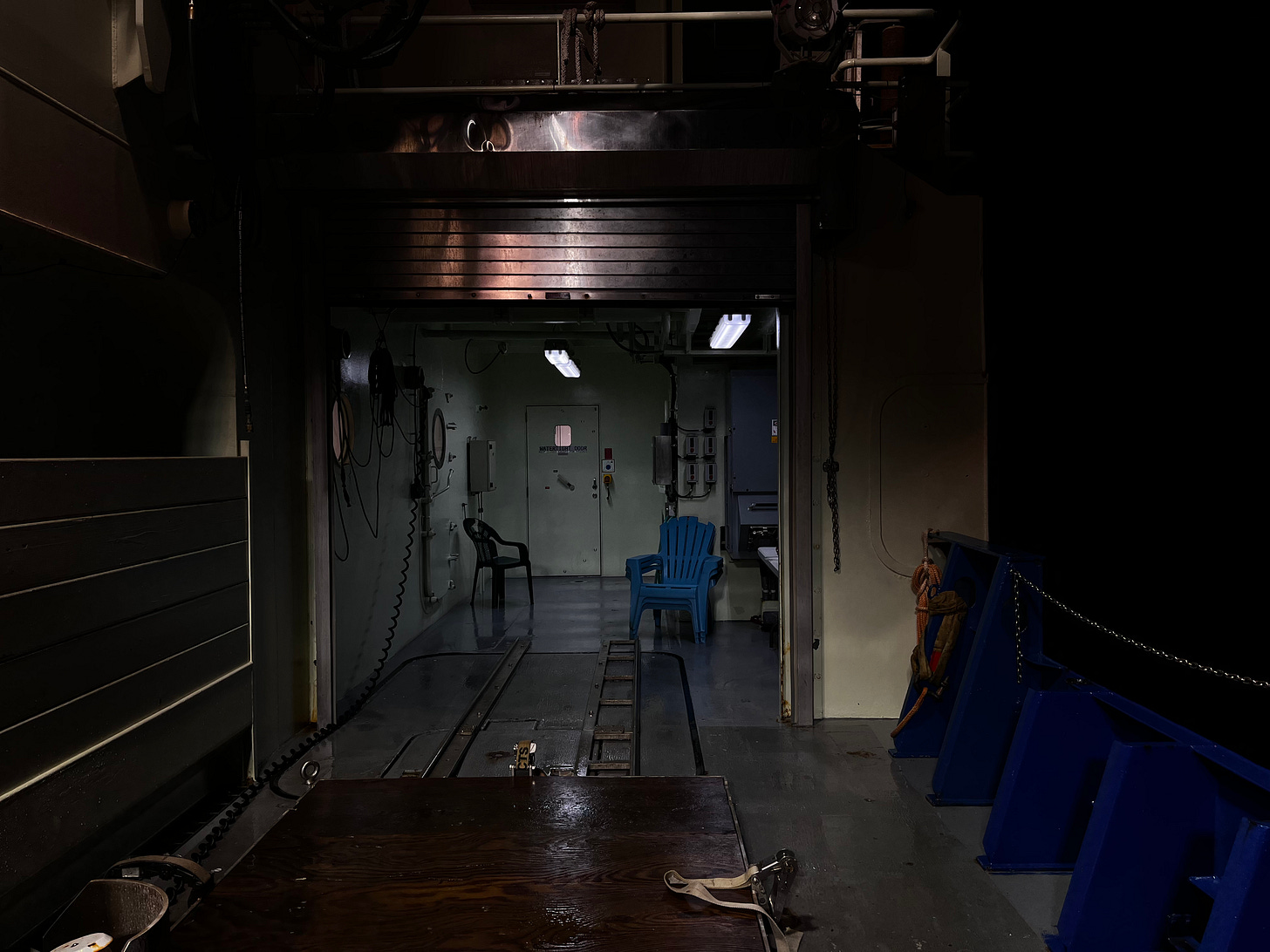
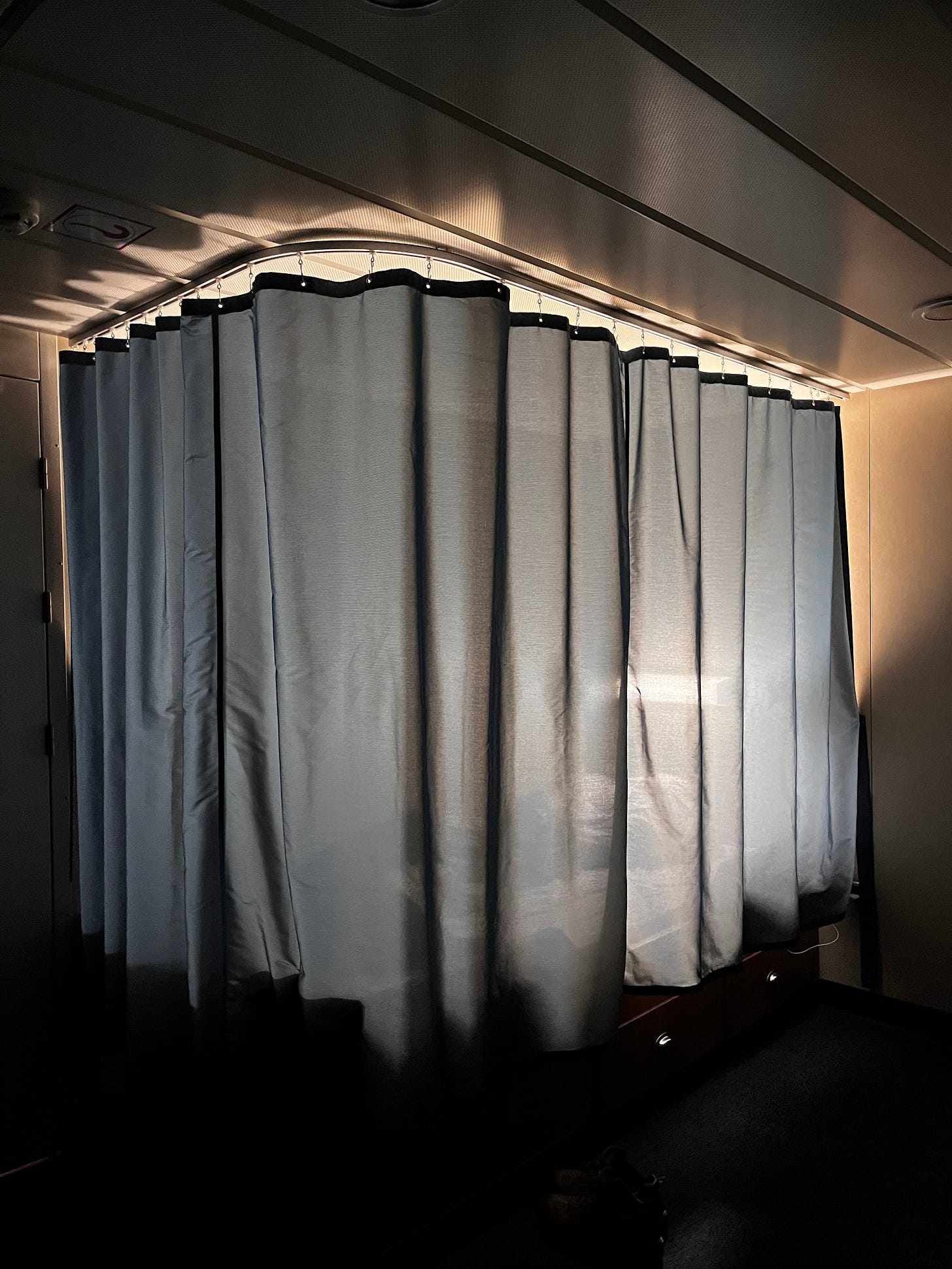

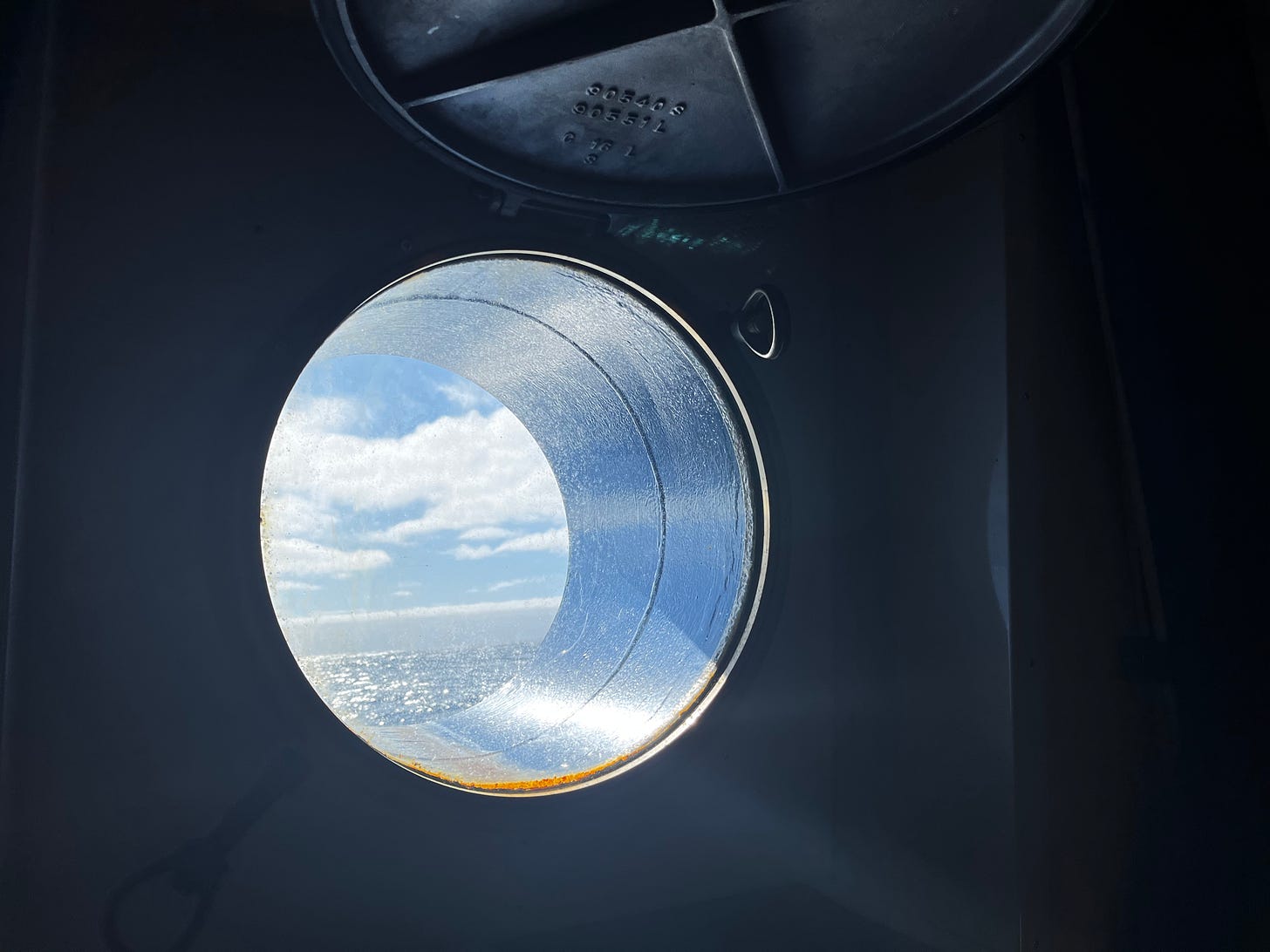

Share this post